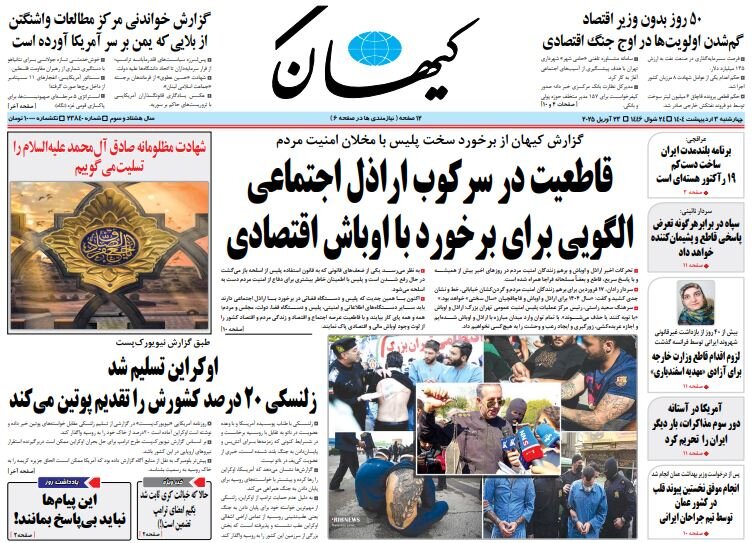Kayhan: Indirect negotiations show distrust in America

TEHRAN - Kayhan dedicated its editorial to the recent U.S. sanctions against Iran and wrote: Without a doubt, it must be said that the chain of U.S. sanctions against the Islamic Republic of Iran, on the eve of the first and second rounds and now, on the eve of the third round of negotiations, contains a special message and the choice of dates cannot be accidental.
Existing evidence and previous experiences indicate that the U.S., contrary to what it claims, is not seeking an agreement acceptable to the Islamic Republic of Iran and continues to insist on its arrogant nature and blackmailing Iran. The U.S. wants negotiations for the sake of negotiations! Trump is seeking to register negotiations with Iran as a privilege in his 100-day record and to announce that the uncompromising Iran has also come to the negotiating table. Iran's wisdom and intelligence, which has emphasized indirect negotiations, is commendable. However, Mr. Araghchi's repeated emphasis that "there is neither reason for much optimism nor pessimism" is also a sign that they are taking an intelligent view of the negotiations.
Arman-e-Melli: Will the outcome of talks be win-win despite lack of trust?
Arman-e-Melli spoke with former diplomat Ali Khorram about the two rounds of talks between Iran and the U.S. and the possible challenges and opportunities between the two countries. He said: The issue of trust comes down to the type of guarantees that Trump will provide to Iran, and the steps that Iran will agree to take. Iran announced at the very beginning that the technology it possesses is peaceful and that it is not seeking nuclear weapons. After the second round of talks, the New York Times quoted the Iranian delegation as saying that Iran is ready to make joint investments in the nuclear field with any country, including the U.S. In such a situation, any country that partners with us will realize that Iran’s nuclear activities are peaceful. Without a doubt, this is a big statement and will silence any opponent. In the current situation, Trump enjoys the opportunity to obtain the approval of Congress because Congress is on his side and is obedient to him. In such a situation, if an agreement is reached between Iran and the United States, the agreement can be turned into law with congressional approval.
Jam-e-Jam: Changing US priorities and leaving Europe out of talks
In a commentary, Jam-e-Jam discussed the absence of Europe from the indirect negotiations between Iran and the United States and wrote: Recently, the United States has shown a greater willingness to negotiate with Iran without European intervention. The technical negotiations scheduled to be held in Oman on Saturday are an example of this approach. Oman, which previously acted as a mediator between Iran and the United States, has now become a place for negotiations in which there is no mention of the presence of European representatives. Reports indicate that the three European powers (France, Britain, and Germany) have been completely left out of the process. Some diplomats have told the media that the United States has taken the initiative without consulting them and that trust between the parties has decreased. Finally, the talks in Oman and Iran’s diplomatic moves with China and Russia indicate that the Iranian nuclear issue is entering a new phase in which Europe plays a marginal role. Europe’s diminished presence can be seen as a combination of Europe’s decline in power, the continent’s inability to fulfill its commitments following the U.S. withdrawal from the JCPOA, and Washington’s changing geopolitical priorities.
Iran: Moscow's role in the negotiations
In a note, the Iran newspaper discusses Russia's possible role in Iran-U.S. nuclear talks and said: In these negotiations, there are two main challenges: first, the fate of Iran's enriched uranium reserves, and second receiving firm guarantees from the West that if Iran adheres to the agreement, sanctions will be permanently lifted and that Iran will not suffer if the U.S. pulls out of the agreement again. From Iran's point of view, the only real guarantee is the signing of a formal treaty by the U.S. Congress. Iran desires to keep its uranium reserves inside the country. Iran believes that it has received informal guarantees that show that the U.S. does not intend to destroy Iran's nuclear program. One solution under consideration is to give Russia the option to return enriched uranium to Iran if the U.S. violates the deal. Such an arrangement would not only give Russia a central role in Iran-U.S. relations but could also reduce the influence of European countries such as Germany, France, and Britain.
